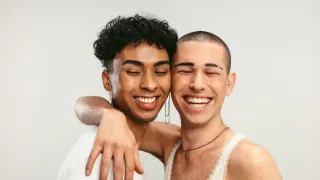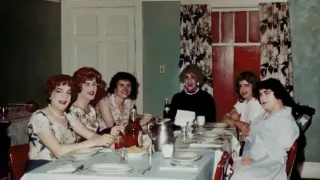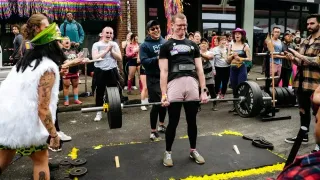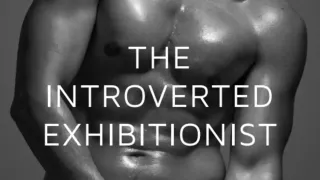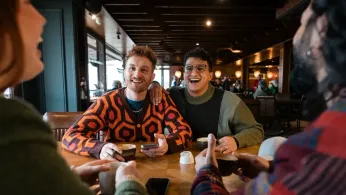
Nov 9
Swiping Left on Labels: How Queer Dating Is Breaking the Mold and Rediscovering IRL Magic
READ TIME: 3 MIN.
If you’ve ever felt the existential dread of updating your dating app profile—agonizing over which label to pick, which pronoun to display, and whether your vibe is “masc enough” or “femme enough”—you’re not alone. According to Hinge’s third annual LGBTQIA+ D.A.T.E. Report, a seismic shift is underway: 28% of LGBTQIA+ daters now say the pressure to define themselves within existing labels feels limiting and inauthentic . For those identifying as queer, it’s nearly half—48% report label fatigue .
This isn’t just a numbers game. It’s a culture shift, and it’s shaping how queer people pursue romance. “LGBTQIA+ daters are redefining attraction, gender roles and relationships—moving beyond rigid expectations to embrace what feels authentic and fulfilling,” Hinge’s report proclaims .
So what’s behind this great un-labeling? For starters, many LGBTQIA+ daters are tired of feeling boxed in by terms that can’t capture the full complexity of their identity, attraction, or relationship goals. Labels, once empowering, have started to feel “tight at the seams,” as Moe Ari Brown, Hinge’s resident love whisperer and marriage therapist, puts it .
Brown explains, “People are wanting to shift an identity label or date someone outside their typical type, and they’re feeling pressure to confirm,” noting that fear of side-eye often keeps folks frozen in the wrong lane. For many queer daters, especially Gen Z, the old scripts just don’t fit anymore. If millennials cracked the closet door, Gen Z kicked it open and redecorated .
The data backs it up: Queer Gen Z daters are 21% more likely than millennials to date across gender expressions, and 39% more likely to reconsider their sexuality label after an unexpected spark . It’s a remix culture—identity and attraction as a DJ set, not a playlist someone else made.
But it’s not only labels that are getting the cold shoulder. Swiping itself is losing its shine. Match Group—the parent company of Tinder, Hinge, and OKCupid—has seen a steady decline in valuation since 2021, as users report feeling burned out, disconnected, and turned off by the endless scroll of faces . A whopping 80% of Gen Z and Millennial users say they’re “burned out,” and even Grindr’s stock has plummeted .
The numbers point to a yearning for something more human, more spontaneous, and less algorithmic. Whether it’s the pressure to “perform” gender—a reported 50% of LGBTQIA+ Hinge daters say they’ve felt the need to present as more masc or femme to attract someone, with 29% regretting not staying true to themselves—or the frustration of feeling like just another swipe, queer folks are looking for ways to reclaim romance .
As a new Bumble spokesman put it: “We see opportunities for AI to help optimize user experiences, and empower people to better represent their most authentic selves to make human connection better, more compatible, and safer.” But the truth is, many queer daters are rediscovering the magic of IRL: the unpredictable meet-cute, the chemistry that can’t be captured in a profile, the joy of being seen for your quirks and complexity .
So how do you date “beyond labels”—offline or on? Brown’s therapist-approved mantra is radical authenticity: being yourself “regardless of who’s watching, even if there’s a threat to belonging.” The advice is clear: “Turn the light all the way up,” because signaling your attraction (and quirks!) is how your people find you .
The D.A.T.E. Report offers practical guidance: ask yourself, “Are labels putting pressure on me to show up a certain way with people I’m interested in? How do I want to express myself authentically?” For many, that means stepping away from the app and into the world—whether it’s a queer bookshop, a dance floor, a community event, or simply chatting with someone cute at the park .
Sarah Lugor, musician and content creator, captured the sentiment in a recent podcast: “Gen Z is pushing back on defining their sexuality in fixed terms. It’s about exploring love beyond labels, and letting yourself be surprised.”
For those who’ve experienced unexpected attraction—someone outside their usual gender or gender expression preferences—**80% said the spark was all about energy and vibe, not labels** .
It’s clear: Queer love is breaking the mold. Daters are remixing identity, challenging gender scripts, and trading the fatigue of swiping for the thrill of authentic connection. Whether online or IRL, the new romance revolution is all about curiosity, courage, and radical self-expression. For the LGBTQIA+ community, that’s a story worth falling for.
